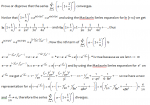I've posted these two questions to the calculus forum but neither has been answered and one has been viewed 15 times and the other 9 times so I am assuming they are at a level higher than calculus even though my instructor insists they are freshman calculus.
I need to decide (prove) if the series sum(n=1 oo) (e-(1+1/n)^n) converges or diverges.
I need to test the integral (o,pi) x/sinx dx for convergence.
I have tried many things and these are the two that I have not been able to get consensus on.
If these are truly freshman calculus, how come no one can answer them but only tell me to try this or that and when I ask them to show me they don't?
Is there someone out here who would care to show me why they decide their answer? I can tell you right now that I don't think either converges but I haven't figured out how to prove either.
I need to decide (prove) if the series sum(n=1 oo) (e-(1+1/n)^n) converges or diverges.
I need to test the integral (o,pi) x/sinx dx for convergence.
I have tried many things and these are the two that I have not been able to get consensus on.
If these are truly freshman calculus, how come no one can answer them but only tell me to try this or that and when I ask them to show me they don't?
Is there someone out here who would care to show me why they decide their answer? I can tell you right now that I don't think either converges but I haven't figured out how to prove either.

